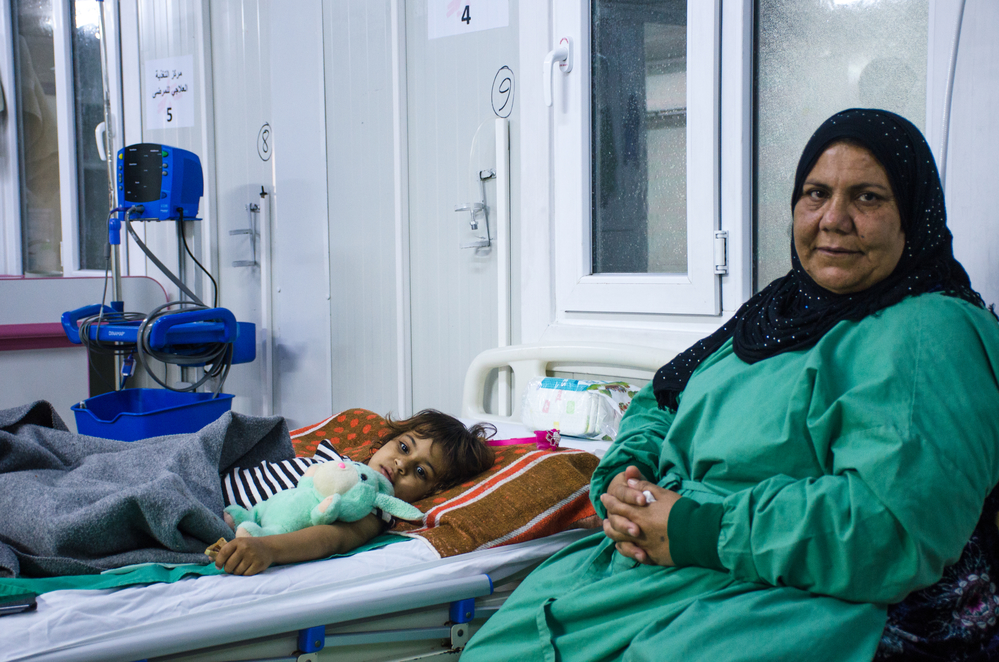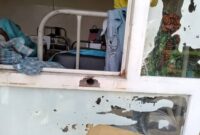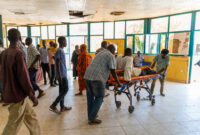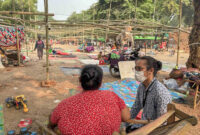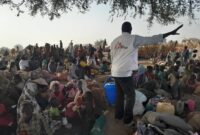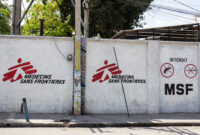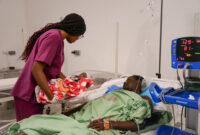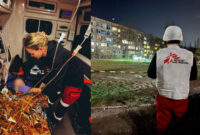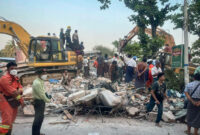Iraq: Caring for burn patients in Qayyarah
In Iraq’s northern sub-district of Qayyarah, merely 60 kilometers south of Mosul the capital of Nineveh province, traces of a war subsided three years ago are still starkly evident. There, Doctors Without Borders/Médecins Sans Frontières (MSF) runs the only hospital specialized in burns in Nineveh, a province still reeling from the shock of a ferocious war that left much of it, including its health infrastructure, in ruins – some of which seems irreparable.
“Its burn season”
Inside, the cries and shouts of a five-year-old girl ring out in one burns unit. Firdous Salah took her family members by surprise when her mother was not around. She reached out to a kettle of boiling water resting on an oil heater and then flipped it over her body. Her right arm, abdomen and both thighs were scalded.
Her grandmother, Telha Ahmed, accompanies her as her mother is preoccupied with caring for Firdous’s siblings in the tent that has become their sanctuary in the wake of a devastating war to retake Iraqi cities from Islamic State (IS) group – a war that has left an abundant number of the population stranded in ramshackle camps across Iraq.

After two and a half years under IS control, the Iraqi army re-took the town of Qayyarah in August 2016. In December that year, MSF opened its hospital there, filling a vacuum left by the partial destruction of the Qayyarah General Hospital and providing healthcare to a population of 300,000 people who were struggling to access health services.
From caring to newborns to providing paediatrics and emergency and intensive care and even mental health consultations: MSF has expanded its health services at the hospital and now patients are referred from all over the province when suffering domestic accidents, injuries from violent incidents, or surviving suicide attempts.
But it is in winter, the burns season, when the bulk of the patients start flocking in to the hospital after suffering domestic fires or surviving self-inflicted burns.
“In April 2018, the first burns unit was inaugurated in the facility with a capacity of 10 beds,” says Dr. Amenah Radhwan, the medical activity manager at the MSF-run facility. But with the start of the winter season last year the hospital increased its capacity to 25 beds “due to the increase in burns patients and as the hospital is the only one specializing in burns in Nineveh,” adds Dr. Amenah.
This winter, temperature in Iraq has plummeted to levels unprecedented in years. At times, snow has blanketed swathes of the country. The thousands of vulnerable displaced families desperately resorting to makeshift heating options in their tents and those living in tumbledown homes suffered the most.
With kerosene heaters crowned by a pot or kettle of boiling water or tea – a staple in most Iraqi houses – the desperate attempt to heat up homes and warm bodies makes accidents frequent.
“It’s difficult, very difficult,” says Telha, Firdous’s grandmother, describing life in Jada`a camp, where Firdous is growing up in the outskirts of the town of Qayyarah – a harsh environment no child should have to bear, but one where thousands of Iraqi children have no choice but to live.
Unlike her peers, Firdous, holding a green teddy rabbit with her left arm, does not utter a word. The five-year old “hasn’t spoken to people other than her immediate family members in years,” Telha, the grandmother, says.
“It’s the shock,” she laments, referring to the deafening sound of bombing that rocked the city of Mosul – the city Firdous’s family escaped when she was a baby – and hurt and killed so many thousands of people.
Across the aisle
Across the aisle from Firdous, Sidiqa Sadiq whispers lullabies in her son’s ears. The two-and-a-half-year old Anas Abdul-Rehman also managed to tip a kettle of boiling water from the cooking stove and spill it over his tiny body. They came all the way from Tal-Afar, a town in western Nineveh nestled in between Mosul and Sinjar district.
Anas’s right arm and upper body are wrapped in bandages; he suffered severe burns on 17 percent of his body. Holding his left hand, where an IV cannula is inserted, his mother sings to him and prays for his recovery: “I haven’t gotten any sleep since the day of his injury. But Inshallah (God willing) he will get better,” she says.
In total this winter, the hospital received no less than 83 burn cases during November, December and January. Dr. Amenah says “the hospital receives patients suffering burns in 10 percent upwards of their bodies, as well as those suffering burn injuries in less than 10 percent of the body, but in sensitive spots such as the face, genitals or across their joints.”
There, burn patients undergo opertions to clean their wounds “skin grafting surgeries and enter the operations theatre multiple times a week – depending on the severity of wounds – for dressing changes under anaesthetic” to avoid the acute pain accompanying the process.
Physiotherapy, although agonizingly painful, is also a vital part of rehabilitating patients, especially those with burns across their joints. It enables them to overcome the pain and gradually regain elasticity, preventing a permanent shortening in their muscles or joints.

Patients at the hospital are closely monitored by staff members: they are vulnerable to dehydration, hypothermia and (most importantly) infection, “as they’ve already lost the first protection layer: their skin,” says the Dr Amenah.
Those with infected wounds are kept in isolation beds under intensive care at the hospital. There are two isolation units with a total capacity of nine beds.
Mental health support is fundamental
At the hospital, mental health support is also fundamental element of recovery. Psychiatrists and counsellors see some burn patients on a daily basis. They address their depression and frustration, alleviate their distress and boost their confidence to help them cope and adjust to a new reality where they do not look the same, and must stay in a hospital bed until they recover.
13-year-old Mustafa Ahmed does not feel pain any more, his wounds are healing and soon he will be out to his hometown: the old city of Mosul. But the slender, pale young chap breaks into tears as he recalls the outings with his cousins there.
“I speak to them over the phone at times, but I can’t help it, sometimes I cry,” he says, sobbing. His young aunt, who accompanies him in the absence of his deceased parents, stands next to his bed – her eyes glitter with tears.
In the old city of Mosul, where the putrid odour of corpses still buried underneath the rubble lingers, almost every corner stands as a reminder of the horrors and losses of the war. It is a war that has weighed heavily on Mustafa, a psychological burden that has only increased with his injury.

When asked about his injury, he says all he remembers is igniting the stove, then his body catching fire and later being rushed to a hospital.
He spent the early days in the hospital unconscious and on oxygen support. He recalls himself then hallucinating; “sometimes I wake up during the night thinking I’m sitting outside. I ask them to let me in,” he says.
“I’m feeling better now,” Mustafa adds.
Some of those treated here are survivors of suicide attempts, mental health staff members say. They believe that suicide is seen as an escape from the trauma of war weaved into the very fabric of their daily life – a life often marred by poverty and uncertainty about the future.
“Some burns patients are in desperate need for mental health support. They often suffer challenges in before they come to hospital, challenges that eventually result in them getting injured,” says mental health counsellor Iman Mohammed.
For burns patients, “rehabilitation isn’t complete without mental health support,” Iman concludes.
